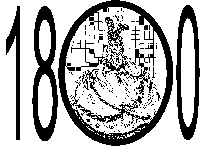
Russia is governed by Pavel, the emperor, the great master of the Maltese award (sacred John Jerusalem's award). His father Peter III Fedorovich was killed on command of his wife, Pavel's mother.
The most unexpected problems worry the emperor. He is indifferent to music, but has cancelled teaching music in institutes where girls of not a nobiliary origin are studying. Training music and dances " being the essential requirement in maiden noble education, becomes not only harmful, but even disastrous for common girl and may carry her away to the societies dangerous to her virtue". In April emperor has issued the decree: "As different books brought from abroad lead to the debauch of belief, civil laws and good conduct... forbid admission from abroad any sort of books ... in any language ... including music... "
Here's one of usual stories for that times. German playwright and the novelist August-Ftidrich Kotsebu had sons, which were brought up in the Petersburg military school . He had decided to stop being the director of court theatre in Vienna and to go to sons, but on border he was arrested and banished to Siberia. Soon the emperor Paul found out that he liked the small play Kotsebu had written: "The Lejb-driver of Peter the Great". The playwright was returned from exile, given a lot of favours and became a general manager of German theatre.
St. Petersburg is clean, beautiful, everything is in order and uniformity. The East is fasionable. Dwellings of grandees are decorated with southern plants, aromas, the Asian sofas. In huge greenhouses with artificial climate fruits of all countries are feeling wonderful. Speech of notable petersburgers is shining with grace and nobleness, but it is not in stile to be heart-felt and frank.
Since 1799 by the order of Petersburg ober-politsmejstera men are forbidden to have bakenbard.
The building of engineering castle of the architect V. I. Bazhenov in St. Petersburg is this year finished by V.F.Brenna.
In Moscow all variety of customs and tribes of Russia coexists. Revelry of individuality is seen both in architecture, and in a manner to spend time and communicate.
The disturbing condition of Europe has driven to Russia set of the French emigrants and natives of other countries, including artists. Usually they are not sparkling with special talents, but find grateful employment for themselves and quite often push aside Russians from an affair.
Jews are not present in Moscow and St. Petersburg. At Ekaterina II times, after including Crimea and Novorossia and sections of Poland into Russian borders the concept about feature of the Jewish settled way of life appeared. Jews are allowed to live in this new parts and have there all the civil rights level with other common people, though pay double taxes. In other parts of empire access for them is forbidden.
All peasants are not free, they belong to somebody - to the emperor, state or to the owner of the land. Those who belong to state pay taxes, work on publik works and are taken to the army as soldiers. They can't leave the place where they live. (Maybe you'll think it strange, but it doesn't differ greatly from the peasants state in Soviet Russia 150 years later). Peasants belonging to the Emperor are called "udelny". Emperor has 464000 men peasants (women are not counted), most of them do what they want to, only must pay a fixed sum called "obrok" (quitrent). Some peasants belong to the department which deals with problems with horses. This peasants live along the roads at post stations and are obliged to make everything for passers-by and help them reach the next station. Some state serfs are attributed to woods of admiralty, a part - to state and private factories. They can't be sold separately from factories and can be punished only under the decision of zemsky court.
Peasants belonging to the land owners have natural and monetary duties. They work on domonical fields (it is called "barschina"), take out lordly products on the market - sometimes for distant places - and in general do everything, that it is necessary for the landowner, by the stock and cattle. And the landowner is responsible for their paying taxes (they pay taxes to the state as well) and should care of their feed in lean years. Sunday and celebratory work is forbidden, and three-day corvee is considered sufficient, but this law is usually ignored. In the places where not agricultural crafts are developeded, not "barschina" but "obrok" is used - peasant are to give the landowner fixed amount of products of an agriculture or money. The amount of payment is defined by the landowner. In such villages peasants are not only independent in domestic life, but use also a significant share of self-management. Quite often they are released on earnings and crafts.
Clerics yet are not exempted from corporal punishments.
For merchant class the honorary title the manufactory - adviser is established. It can be given to a merchant. who belong to the first guild not less then 12 years in succession.
Militarians all are dressed in long dark green caftans, short pale-yellow waistcoats and long overcoats collars, cuffs and lapels of various color . Officers are obliged to carry canes.
Soldier's children are considered accepted on military service from the moment of birth. Since 12 years they are placed to one of military - orphaned institutions. The active service begins from 15-years age, and they are obliged to serve 15 more years. On the same term volunteers (vol'noopredeljajushchihsja) are accept. Recruits are obliged to serve 25 years.
Since 1786 there is a Service of go-ahead messages on weather, kinds on a crop and the prices for bread. It will exist prior to the beginning of XX century.